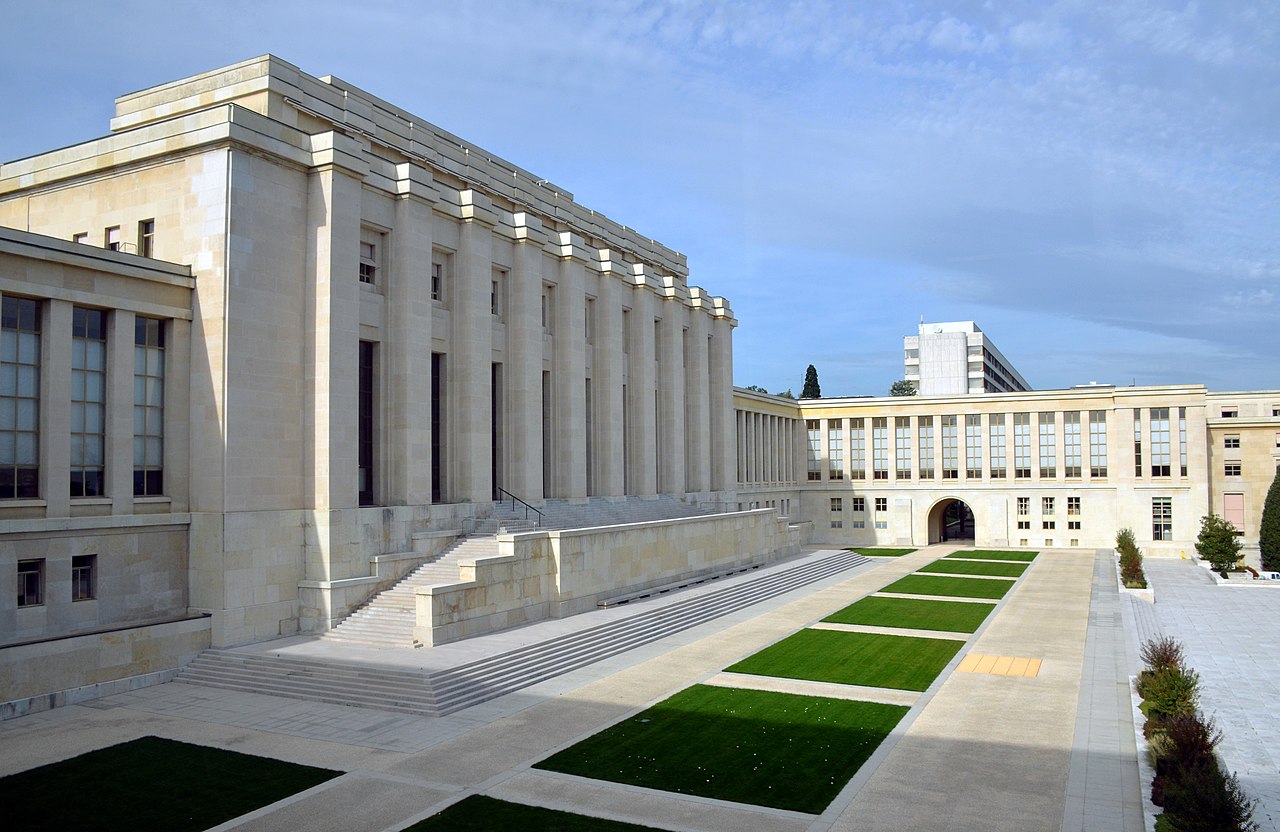Travel Notebook
The Second Session of the Preparatory Committee (PrepCom) for the 11th Nuclear Non-Proliferation Treaty (NPT) Review Conference concluded in Geneva on August 2. It included the debates on the FMCT, the CTBT, the NWFZ, the provision of negative guarantees to non-nuclear-weapon states, the situation with ZNPP, and other topical issues.
Alexandra Zubenko, an M.A. Candidate in the International Dual Degree M.A. Program “Global Security, Nuclear Policy, and WMD Nonproliferation” (MGIMO-MIIS-PIR Center), attended the Session. We are pleased to share the principal findings Alexandra noted from the event.
The Second Session of the Preparatory Committee for the 11th NPT Review Conference took place in Geneva from July 22 to August 2. The NPT Member States could not reach a consensus on the summary of the Preparatory Committee’s work, and rivalry outstripped the spirit of cooperation. Given the paucity of dialogue, the exchange of views in the debate hall and during the side events was of practical importance; yet, the prospects for compromise will continue to depend on the dynamics of the international situation.
Cluster I: Disarmament
In the disarmament cluster, the issues of arms control, the FMCT, the CTBT, the NWFZ, and the provision of negative guarantees to non-nuclear-weapon states have come to the fore. The main concern of the participants in the Arms Control Review Process was expected to be the prospects of the Russia-US cooperation to reduce or at least maintain the previous ceilings of deployed nuclear warheads after the end of New START.
Interestingly, the US delegation, unlike the EU delegation, in the initial statement on the first cluster did not mention the suspension of the New START by Russia but instead pointed to alleged non-compliance with existing obligations and a direct rejection of the dialogue on arms control.
One of the possible reasons might be that the United States is not sure whether they will be able to comply with the ceilings on the New START in the future. There is a lively discussion in the US Congress about whether it is necessary to increase the number of deployed nuclear warheads to more than 1,550 (allowed under the New START). According to some American experts, if the New START is not extended or replaced by a new treaty in 2026, it will be impossible to contain the pressure of the “nuclear lobby.” In addition, the current presidential race makes it unclear, since if Donald Trump becomes president (he did not want to extend the treaty during his presidency), there is a possibility that the American side may cease compliance with the Treaty before 2026.
At the same time, the chances of resuming dialogue before the expiration of the New START, indeed, remain low: Russia does not agree to conduct a strategic dialogue in isolation from the conflict in Ukraine and, according to Washington, has not even responded to the US proposals for dialogue; the United States does not want to take into account the objective connection between the strategic dialogue and the current conflict in Ukraine.
Nuclear Doctrines and No-First-Use Policy
The issue of nuclear doctrines has already become one of the main topics for discussion not only within the framework of the Review Process but also within the framework of the meetings of the Nuclear Five. However, amid the ongoing review of the Russian nuclear doctrine and the subsequent likely response from the United States, the discussion hasn’t become substantive.
In light of recent US proposals to start arms control negotiations with China, China has put on the agenda the inclusion of provisions on no-first-use in nuclear doctrines of all P5 States. In a working paper for the Second Session of the Preparatory Committee, the Chinese delegation invited the Nuclear Five countries to conclude a mutual agreement on no-first-use.
It should be noted that for the first time, China submitted a draft of such an agreement for the five countries in 1994, but only Russia agreed to the proposal for consultations back then. As a result, the bilateral commitments on NFU between Russia and China were taken. Today, the United States is showing more interest in the Chinese proposal, hoping to use it as an excuse to discuss arms control in general. Earlier, the Chinese side rejected two US proposals to start an official dialogue.
Some American experts on the sidelines of the Conference suggested that China would not be ready to engage in dialogue for at least the next two or three years. First, in light of the upcoming Chinese presidency of the N5, China will have the opportunity to discuss this issue in a multilateral format. Secondly, the United States insists on discussing the issue of transparency of the Chinese nuclear arsenal, which is not in China’s interests in the current conditions of disparity with the United States.
In general, the discussion on doctrines has not yet received a clear outline: the President’s summary of the Conference was also limited to general calls for reducing the importance of nuclear weapons in the doctrines of nuclear-weapon states and increasing transparency measures.
TPNW
There has not yet been any rapprochement between the positions of the Nuclear Five and the countries participating in the TPNW, but the latter have decided not to go into confrontation with N5 in the current Review Cycle. It should be noted that, as the chairman of the Second Committee, Kazakhstan managed to smooth out the differences between opponents and supporters of the TPNW quite neatly. Thus, Kazakhstan, which is one of the leaders of the TPNW, issued a joint statement on behalf of the countries participating in the TPNW, stressing that the TPNW is a treaty “complementing” the NPT.
In the summary of the Chairman of the Conference, it was said that some states do not consider the TPNW to be an “effective measure” because it does not take into account the extremely complex military, political, and technical difficulties on the way to the elimination of nuclear weapons. Nevertheless, some countries participating in the TPNW expressed concerns that too cautious rhetoric did not contribute to the legitimization of the treaty, and the problem of slowing down the ratification of the TPNW was ignored in favor of the interests of nuclear-weapon states.
Providing Negative Security Assurances to Non-Nuclear-Weapon States
The issue of strengthening negative assurances by nuclear-weapon states has also been put high on the agenda of the current Review Cycle. Nuclear and non-nuclear-weapon states have proposed several ways to strengthen negative assurances, including the conclusion of separate agreements with nuclear-weapon states on negative safeguards, the creation of a subsidiary body on security guarantees at the 2026 Review Conference, the signing of protocols to treaties on nuclear-weapon-free zones, the creation of an ad hoc committee on negative security guarantees within the Conference on Disarmament. However, according to the estimates of the IAEA and SIPRI Expert, Dr. Tariq Rauf, a member of the PIR Center Advisory Board, the maximum that nuclear-weapon states can agree to is the conclusion of protocols to nuclear-weapon-free zones.
Clusters II and III: Nonproliferation and Peaceful Use of Nuclear Energy
In the second and third clusters, the agenda, as a whole, remained the same as in the last 10th Review Cycle. The offensive rhetoric around the ZNPP has slowed down, although it has not become more constructive. Western countries continued to use the Review Cycle as a platform to promote political demands for the return of the ZNPP to the control of Ukraine. The Russian delegation stressed that the ZNPP is located on its territory and that there are no unauthorized military equipment and personnel at the station. No specific ideas were put forward regarding the issue of ensuring the safety of the plant; the West recognized the leading role of the IAEA in addressing the safety of the NPP, emphasizing the importance of observing the Five Concrete Principles of ensuring safety and security of the plant, presented by the Director General of the IAEA to the UN Security Council in 2023.
In the third cluster, special attention was paid to the issue of improving the effectiveness of the NPT Review Process. As known, the working group on this issue was unable to make recommendations for the Second Session of the Preparatory Committee. As the Russian delegation noted, some non-nuclear-weapon states at the last moment submitted proposals for consideration relating exclusively to issues of transparency and accountability of nuclear-weapon States and tried to impose them on the rest of the group members. Since the mandate of the working group has expired, it is expected that the issues of improving the effectiveness of the NPT Review Process will continue to be discussed exclusively within the third cluster of the Review Process.
Conclusions
The work of the second Preparatory Committee can’t be considered successful, states-parties failed to reach a consensus on the summary of the PrepCom. In addition, it is obvious that within Nuclear Five, which had been the driver of the Review Process for many years, the political differences are still too strong, which creates obstacles not only to common political will but even to dialogue on certain issues of the non-proliferation regime. As one of the participants of the conference said, some delegates from Western countries were even forbidden to be in the same room with members of the Russian delegation outside the general debate hall.
The restructuring of the system of international relations is taking place at all levels and affects many dialogue platforms including the NPT Review Process. At this stage, each side is trying to earn political points and hopes for changes in the international context that will allow it to enter the next stage with stronger cards. China is not ready to discuss its nuclear program until after modernization or achieving parity with the United States. The US and the EU are still hoping for a “strategic defeat” of Russia. Russia is not ready to discuss arms control in isolation from the conflict in Ukraine (i.e. while the EU and the US do not recognize its security interests). Nevertheless, all the participants of the Nuclear Five, in one way or another, expressed interest in the position of the other side. It was clear that, along with the development of accusations, more careful and silent work was being carried out to identify possible points of convergence in the future.
Whether these conclusions will be used or not during the third Session of the Preparatory Committee, which will be held in New York from April 25 to May 9, 2025, will largely depend on the development of the Ukrainian conflict and the international situation in general.
As the delegation of Kazakhstan noted at one of the final Sessions of the PrepCom, “the existing Review Process manages to fulfill its designated technical function, for the most part.”
August 8, 2024
Alexandra Zubenko
Geneva – Moscow
Key words: International Security; Nuclear Nonproliferation; NPT
NPT
F4/SOR – 24/08/08



